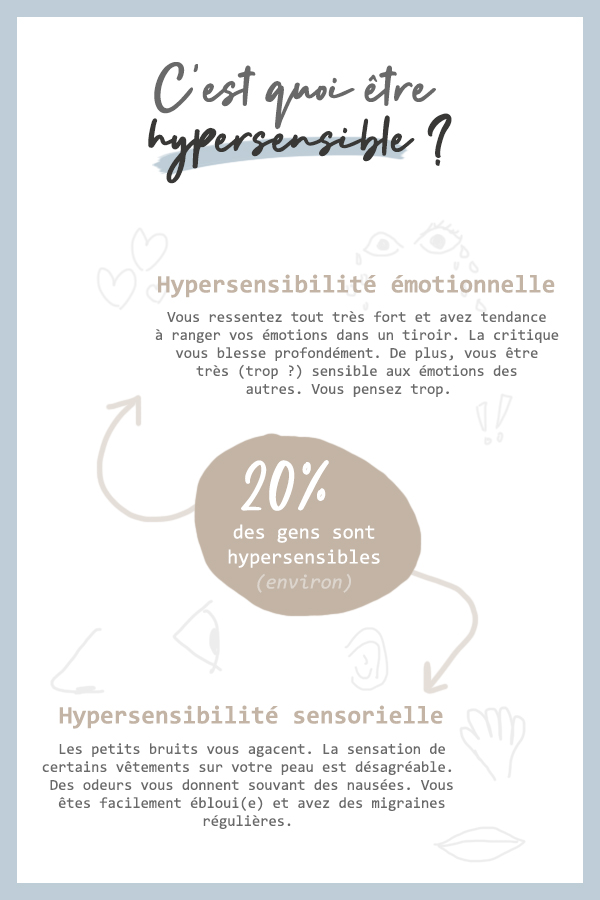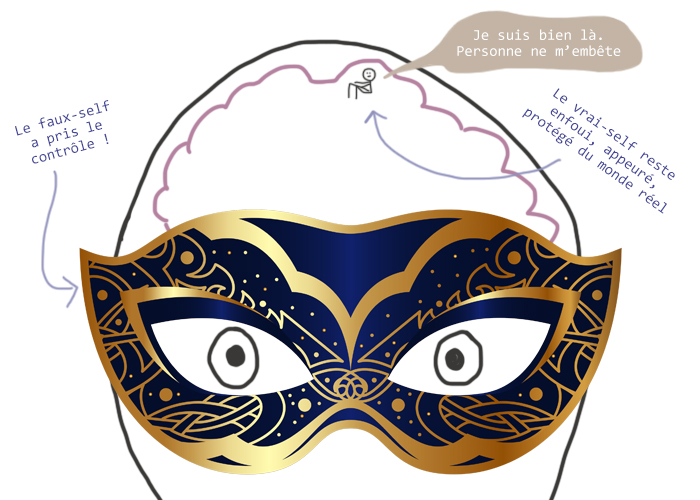La personne à haut potentiel intellectuel développe fréquemment une grande sensibilité au monde extérieur appelée hypersensibilité. Je ne vais pas revenir en détails sur le fonctionnement des personnes hypersensiblescar c’était le sujet de l’article précédent. Pour les retardataires, j’ai inclus ci-dessous les deux infographies récapitulatives dans lesquelles vous retrouverez quelques grandes idées évoquées. Aujourd’hui, je m’intéresse à un « problème » lié à la gestion de mes émotions : comment gérer mon hypersensibilité ? En effet, je me suis jusqu’alors beaucoup documenté sur ce que c’était que d’être un surdoué hypersensible, mais très peu sur la façon de gérer ses émotions, sa grande émotivité, son potentiel émotionnel.


Je vais donc commencer par parler des difficultés liées à l’hypersensibilité et les problématiques qui apparaissent. Cela permettra par la suite de mieux identifier des potentielles solutions. Aussi, je me permets de préciser que je ne parlerai ici que d’hypersensibilité émotionnelle – et non pas sensorielle. En effet, cette dernière est liée à une intégration sensorielle ressentie comme douloureuse des stimuli sensoriels par le système nerveux. C’est une toute autre histoire, détaillée dans mon article sur l’hyperesthésie.
Les difficultés liées à l’hypersensibilité
Une grande capacité émotionnelle peut être la source de nombreux maux. Oui oui. Prenons par exemple un enfant à haut potentiel extrêmement précoce : moi. Je me suis toujours senti attaqué par mes émotions. Elles étaient trop fortes, et j’ai eu beaucoup de mal à les gérer lorsque j’étais plus jeune. Je me trouvais trop sensible, trop émotif, j’avais les émotions à fleur de peau. J’étais anxieux parce que tout me faisait mal, mais également tendu parce que je remarquais petit à petit que les autres ne ressentaient pas les choses comme moi. Je m’émerveillais pour peu, eux pour pas grand-chose.

En fait, cette sensibilité exacerbée provoque chez les zèbres un sentiment de décalage avec les autres. Du coup, ils mettent en place un système de défense appelé faux-self. C’est une façade publique qui protège du monde extérieur. Un sorte de masque ou de seconde personnalité qui se conforme à la société et qui protège nos petits cœurs sensibles de la surcharge émotionnelle. Chez les surdoués, ce faux-self est aussi utilisé pour camoufler le fonctionnement cognitif différent lié au haut quotient intellectuel et à la douance. Il est super pratique donc, car il permet de se forger le trait de caractère parfait : un peu sensible, affectif et empathique – mais pas trop ! Surtout pas trop d’ailleurs.

Selon moi, le danger de l’hypersensibilité réside dans sa mauvaise gestion. Comprenez bien que les émotions sont superbes à vivre (et il faut d’ailleurs les vivre !). Je pense donc qu’en ce sens être hypersensible est un cadeau. Cependant, elles ne doivent pas nous gouverner et nous faire vivre des montagnes russes émotives quotidiennes. À ce sujet, l’intelligence émotionnelle est un superbe outil !
Être sensible peut induire deux mauvaises situations. La première, c’est donc d’être complètement emporté par ses émotions – ce dont on vient de parler. La seconde, qui est celle dans laquelle j’étais, arrive quand le faux self prend une part trop importante dans nos vies. Si importante que le vrai self est enfui très profond en nous-même, au point d’avoir parfois un peu (beaucoup) de mal à le retrouver et à se souvenir de quoi il a l’air. Il est donc primordial de savoir comment gérer son hypersensibilité, pour être en mesure de s’épanouir.

4 étapes pour mieux gérer son hypersensibilité
Voici donc comme convenu une méthode en quatre étapes pour apprendre à mieux gérer son hypersensibilité. Elle me semble parfaitement retracer le chemin mental que j’avais fait de mon côté.
1 – Prenez conscience de votre hypersensibilité
Le premier pas pour mieux gérer son hypersensibilité, c’est de savoir de quoi il s’agit. Si vous êtes en train de lire ces lignes, vous êtes alors déjà sur la bonne voie. Ensuite, il faut reconnaître que l’on est une personne hypersensible – ou du moins que l’on a des comportements émotionnels différents. Pour cela, l’aide potentielle d’un(e) psychologue peut être un atout.
Dans mon cas, je me suis rendu compte que « quelque chose clochait » en primaire. Je ne saurais plus dire exactement en quelle classe – ça date quand même ! – mais je me souviens très nettement de la sensation de ne pas être à ma place et de décalage avec mes camarades. En plus, c’est brutal la cours de récréation. Pour une simple carte Pokémon abimée ou un pull jugé moche on se retrouve haï et laissé sur le côté. Des fois on allait jouer au foot avec mes copains. Je terminais toujours par pleurer parce que je n’étais pas choisi rapidement comme coéquipier. Avec toutes ces émotions négatives, bonjour l’estime de soi. Heureusement, j’arrivais à être heureux parce qu’il faisait beau dehors et que je voyais un oiseau dans les arbres par la fenêtre (il devait être content cet oiseau car il avait un bel arbre sur lequel se poser), ou parce que mon nouveau stylo à plume avait écrit d’un beau bleu comme j’aimais.
Bref, j’étais différent. J’étais (trop) content, (trop) triste, (trop) intéressé, (trop) stressé, (trop) émerveillé ou (trop) excité – mais jamais un peu. Avec le recul et les quelques souvenirs que j’en ai, je me rends compte que mon hypersensibilité a toujours été présente. Et quand on me parle de mon comportement lorsque j’étais encore plus jeune, je la vois aussi à travers mes gestes et mes réactions. C’est très touchant.
2 – Accepter notre hypersensibilité
Maintenant que vous avez observé des comportements hypersensibles chez vous, passons à la seconde étape pour gérer son hypersensibilité : l’acceptation. Pendant longtemps, j’ai vu mes sentiments exacerbés comme une mauvaise chose. Et puis, ma grande empathie me rendait trop sensible aux émotions des autres. Ces mauvais points sont totalement légitimes. Cependant, ils permettent de développer beaucoup de nouvelles (belles) compétences !
Pour commencer, l’empathie est à double tranchant. Elle apporte aussi de belles opportunités et est une qualité recherchée en entreprise. Ensuite, l’intuition est particulièrement développée par l’hypersensibilité. Tout comme l’extra-lucidité, ou la créativité. Une grande sensibilité émotionnelle permet de se passionner pour ce que l’on fait, et de vouloir créer un monde meilleur.
En fait, il faut voir l’hypersensibilité comme un super pouvoir qui permet de rendre les choses plus belles, plus intenses, plus profondes. Seulement, comme chaque grand pouvoir, il faut être en mesure de le contrôler pour ne pas qu’il nous contrôle.

Accepter son hypersensibilité, c’est en fait juste accepter le fait que l’on ressente certaines choses différemment. Ce n’est ni grave, ni dangereux. Nous avons une plus grande sensibilité au monde, il a plus de couleurs.
3 – Maîtriser son hypersensibilité
La comparaison avec le super pouvoir qu’il faut contrôler amène parfaitement à la troisième étape : la maîtrise de l’hypersensibilité. Être hypersensible, c’est être une éponge émotionnelle. Vous absorbez les émotions et les énergies des gens. Vous vous en nourrissez. Mais comme n’importe quelle éponge, vous avez parfois besoin d’être essoré(e). Sinon, vous allez moisir (et ça, c’est pas ce qu’on cherche !). Donc pour ça, il faut laisser évacuer vos émotions. On appelle ça la régulation émotionnelle.

Une solution s’offre à vous pour vous libérer de ces charges sensorielles et émotionnelles : vous isoler. L’hypersensible a besoin de repos. En effet, être seul(e) va vous donner l’occasion de passer du temps avec vous-même, d’apprendre à vous connaître et à connaître vos émotions. Ça peut sembler un peu ridicule comme ça, mais lorsque je m’étais trop enfui dans mon faux-self j’avais parfois du mal à me retrouver et à savoir ce que j’aimais vraiment. Pas le Paul que les gens connaisse. Le vrai Paul. M’isoler m’a donc fait le plus grand bien. Alors attention, il ne s’agit pas de rester assis (seul) à regarder par la fenêtre – sauf si c’est ce dont vous avez envie. Je préconise plutôt de faire quelques activités, comme de l’art (écriture, musique, dessin, etc.) ou des activités anti-stress (sport, méditation par exemple). Faites des activités avec vous-même pour voir ce que vous aimez, et surtout ce que vous ressentez en le faisant. Et puis, entourez-vous d’énergies positives, comme la nature qui vous permettra de vous reconnecter au monde, ou avec des personnes de votre entourage qui sont encourageantes.
4 – S’aimer et ne pas être dur envers soi-même
C’est en faisant ce gros travail d’introspection que j’ai fait des découvertes étonnantes sur moi :
- Non, je n’aime pas être en boîte de nuit tous les week-ends alors que c’est ce que je fais depuis plusieurs années. Finalement, je préfère une bonne bouffe, un bouquin et au dodo tôt pour profiter à fond du lendemain ;
- Oui, j’ai beaucoup de sentiments que j’avais trop cachés au fond de moi derrière une façade frigide ;
- En fait, j’aime pas trop le shopping – même si je suis gay ;
- J’aime beaucoup les musées, mais pas pour les œuvres. J’aime les musées pour les gens qui y vont. Généralement, ce sont des personnes curieuses et ouvertes, prêtes à découvrir de nouvelles choses. Et ça, ça me plait. L’art, j’y comprends rien.
Ces découvertes – parfois inintéressantes – ont eu un effet incroyable sur moi. Tout simplement parce que c’est moi. Il est là, le vrai Paul. C’est lui. J’ai les yeux qui piquent rien qu’à l’écriture de ces lignes (ah, l’hypersensibilité). En fait, en me (re)découvrant, je me suis accepté. Totalement. Je me suis aimé. C’est vraiment bizarre à dire, mais je me suis (re)rencontré. Et j’ai aimé ce que j’ai trouvé. C’est cette hypersensibilité qui a fait de moi, petit enfant surdoué, l’homme que je suis aujourd’hui.
Aujourd’hui encore, mes émotions me bouleversent. Ça arrive tous les jours, voire plusieurs fois par jours. Mais au lieu de les ranger dans un tiroir et de les ignorer, je les embrasse. Elles font de moi ce que je suis, et j’aime ce que je suis. Je ne pense pas que les exprimer à chaque fois soit pertinent (et j’aurais l’air complètement fou), mais en tout cas il ne faut pas les ignorer et il faut les accepter. C’est maintenant ce que je fais, et je répète régulièrement ce processus d’isolement – même quelques heures par-ci par-là.
Conclusion sur la gestion de son hypersensibilité
Beaucoup de gens (dont moi avant) pensent à tort que la sensibilité est une fragilité. Non. Faire preuve de sensibilité, c’est en fait faire preuve d’humanité. C’est la nature même de l’Homme. Ainsi, il est important que chacun libère son potentiel émotionnel.
Pour savoir comment mieux gérer son hypersensibilité, je vous recommande cette méthode en 4 étapes :
- Prise de conscience de son extrême sensibilité : regardez vos comportements et réaction avec un œil extérieur. Voyez-vous des tendances hypersensibles ?
- Acceptation de sa sensibilité excessive : si oui, comprenez bien que cette hypersensibilité est un cadeau. C’est votre super pouvoir à vous. Vous voyez le monde différemment, avec plus de vie, plus de couleurs, plus d’intensité.
- Gestion et maîtrise de sa belle sensibilité particulière : des fois (souvent), vous allez être submergé(e) par vos émotions et celles des autres. C’est normal, mais il faut apprendre à relâcher la pression parfois pour ne pas se blesser. Pour cela, isolez-vous un petit peu et pratiquez une activité qui vous plait et qui vous permet de vous concentrer sur vous-même.
- Amour de soi : avoir une sensibilité comme la vôtre est une bénédiction. Lorsque vous l’aurez accepté et que vous arriverez à la gérer, vous serez en mesure de vous aimer. Surtout, ne soyez pas dur envers vous-même.
Sources
- Tess (TEDx Réunion), Comment vivre avec son hypersensibilité, 2019.
